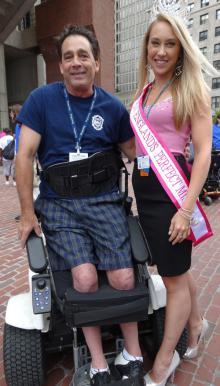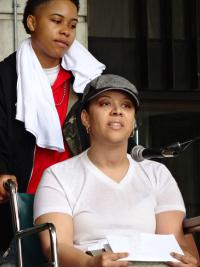July 29, 2014
 Jerry Donovan and Caitlin Weiler: At the City Hall observance of the ADA anniversary. Photo by India SmithOn Thursday, July 24, Boston’s disability community met on City Hall Plaza to commemorate the Americans With Disabilities Act, signed on July 26, 1990. The gathering included people using wheelchairs, people using American Sign Language, and people assisted by service animals, as well as personal care attendants, family members and many other supporters. Instituted four years ago by Kristen McCosh, Boston’s Commissioner for Persons with Disabilities, the annual event marks progress toward the full inclusion of persons with disabilities in all aspects of city life.
Jerry Donovan and Caitlin Weiler: At the City Hall observance of the ADA anniversary. Photo by India SmithOn Thursday, July 24, Boston’s disability community met on City Hall Plaza to commemorate the Americans With Disabilities Act, signed on July 26, 1990. The gathering included people using wheelchairs, people using American Sign Language, and people assisted by service animals, as well as personal care attendants, family members and many other supporters. Instituted four years ago by Kristen McCosh, Boston’s Commissioner for Persons with Disabilities, the annual event marks progress toward the full inclusion of persons with disabilities in all aspects of city life.
According to McCosh, the day is not meant for long speeches, but is mainly a time to get together and celebrate. This year’s event began with a procession around City Hall Plaza, following a route that has been made wheelchair accessible in part because of the mandate of the ADA. After looping around City Hall, the parade returned to a tent where several organizations had set up tables. The Massachusetts Rehabilitation Commission, Spaulding Rehabilitation Hospital, the Massachusetts Commission Against Discrimination and others were offering information. Lines formed at food trucks and a hot dog stand, while Radio 103.3 provided background music.
Dorchester resident Ann Siegel of the Boston Center for Youth & Families was handing out brochures on activities for kids. Many of the center’s programs are in Dorchester and Mattapan.
“Most of our programs are not specifically for people with disabilities,” said Siegel, “but we make accommodation for individuals as needed.”
The organization’s pools and other facilities are wheelchair accessible.
Jerry Donovan and Caitlin Weiler, both Dorchester natives, were recruiting volunteers for Spaulding’s spinal cord injury program. A tall blonde, Weiler wore the sash and crown she has won as New England Perfect Miss.
“I don’t get much chance to wear my crown,” said Weiler. But as attendees came by to request a photo, she and Donovan had a chance to make their pitch for volunteers.
As promised, speeches were brief. McCosh reported that the Boston Redevelopment Authority has instituted an access audit for all new developments in the city. This fall Boston Main Streets will begin a pilot program for accessibility in business districts. TV coverage of City Council and BRA meetings will now be closed-captioned. And a parking program is underway for personal care attendants working in neighborhoods with resident parking restrictions.
 Heather Watkins: Photo by India SmithMcCosh then introduced Heather Watkins, chair of the commission’s advisory board. “Board members have different disabilities and live in different neighborhoods, so their input is very important to our community,” said McCosh.
Heather Watkins: Photo by India SmithMcCosh then introduced Heather Watkins, chair of the commission’s advisory board. “Board members have different disabilities and live in different neighborhoods, so their input is very important to our community,” said McCosh.
Watkins, a Dorchester resident, expressed pride in being the first woman and first person of color to serve as chair.
“The diversity in our community is very evident here today,” said Watkins. The media seem to have missed the significance of this. Someone with a disability brings diversity to any setting he or she is part of, Watkins said.
Felix Arroyo, Boston’s chief of health and human services, read a proclamation from Mayor Martin Walsh honoring the Boston Center for Independent Living. BCIL has advocated for disability rights since 1974. In accepting the award, executive director Bill Henning drew repeated applause when he thanked Mayor Walsh for insisting that residents of Beacon Hill agree on modifying curbs and sidewalks in their historic neighborhood.
“We’ve got to have access,” Henning said. “We’re all one city.”
Topics:



